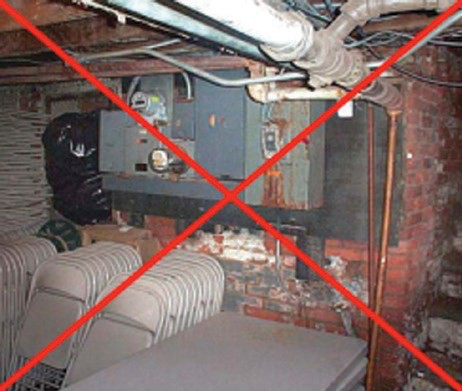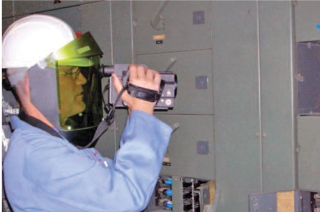
How to prevent costly electrical system problems
Why preventive maintenance is more important than ever

Electrical equipment rooms that are used for storage can create property and liability exposures. Photo courtesy HSB.
Electrical-related fires are occurring more often and causing more severe losses. Like the country’s aging and overburdened electrical infrastructure, buildings and electrical systems are aging and may not be designed to handle the load most businesses need as they add more equipment.
Inadequately maintained electrical systems also are a leading cause of business interruption, poor energy efficiency, equipment wear-out and breakdown—all costly problems. An effective electrical preventive maintenance program can reduce your risk of an unscheduled outage by as much as 66% according to statistics from the Institute of Electrical and Electronics Engineers.
What you can do to keep your electrical system safe
Focus your electrical preventive maintenance program on the most common and frequent problems leading to electrical fires and equipment failure. That includes inspection and preventive measures to ensure electrical apparatus is kept clean, cool, dry and tight.
Keep it clean

Infrared thermographers look for hot spots that could indicate loose connections and other electrical problems. Photo courtesy HSB.
- Electrical apparatus and equipment rooms should be free of excessive dust and dirt accumulation.
- Don’t use electrical equipment rooms for storage.
- Limit access to authorized operations and maintenance personnel.
- Maintain proper lighting to ensure correct and efficient operation and maintenance.
Keep it cool
- Prevent excessive heat buildup in electrical apparatus enclosures and equipment rooms.
- Exceeding design temperatures could be a fire hazard, and can also shorten the life of equipment.
- Maintain cooling fans or blowers installed on equipment to provide adequate cooling.
- Keep ventilation openings in equipment enclosures clean and free from obstruction.
- Change or clean any installed filters according to the manufacturer’s recommendations.
Keep it dry
- Keep equipment rooms dry and protect equipment from moisture. Persistent exposure and direct contact with moisture can cause equipment to fail or shorten its life.
- Check equipment for moisture contamination. If found, examine equipment for damage and get necessary repairs made. Identify and eliminate the source of moisture.
Keep it tight
- Loose connections are the most common source of electrical equipment failure.
- Check all connections and ensure they are kept tight.
- Follow any applicable manufacturer’s instructions for tightening.
- Get an infrared imaging survey to test for loose connections.
Where to begin with a maintenance program
The first step in conducting electrical equipment maintenance is following applicable jurisdictional code requirements and specific manufacturers’ recommendations.
Regular and routine maintenance is extremely important. Preventive maintenance should be performed at least every three years or more often when conditions warrant.
Please remember, it takes qualified and competent maintenance personnel to properly, safely and effectively maintain electrical equipment.
Electrical system maintenance increases safety and decreases losses. Reduce your risk of fire, equipment breakdown, business interruption, equipment inefficiency and premature wear-out with a preventive maintenance program.
To learn more about Hanover Risk Solutions, visit hanoverrisksolutions.com
Copyright © 2014—Hartford Steam Boiler Inspection & Insurance Co.
The recommendation(s), advice and contents of this material are provided for informational purposes only and do not purport to address every possible legal obligation, hazard, code violation, loss potential or exception to good practice. The Hanover Insurance Company and its affiliates and subsidiaries ("The Hanover") specifically disclaim any warranty or representation that acceptance of any recommendations or advice contained herein will make any premises, property or operation safe or in compliance with any law or regulation. Under no circumstances should this material or your acceptance of any recommendations or advice contained herein be construed as establishing the existence or availability of any insurance coverage with The Hanover. By providing this information to you, The Hanover does not assume (and specifically disclaims) any duty, undertaking or responsibility to you. The decision to accept or implement any recommendation(s) or advice contained in this material must be made by you.
LC FEB 2019 10-418
171-0927 (4/17)
